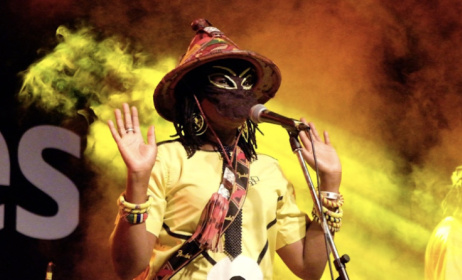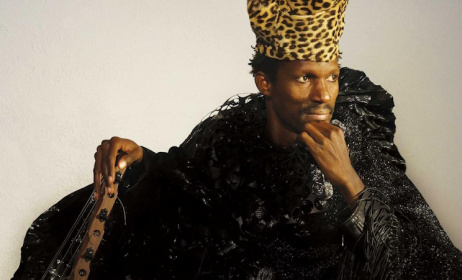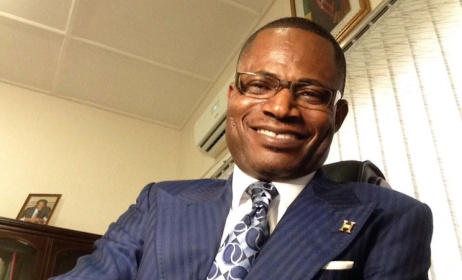Interview: Agorsor band on music, fine art and spirituality
Like fellow artists around the world, Ghanaian band Agorsor continues to reel from the effects of the COVID-19 pandemic, which lead singer Nyornuwofia likens to an evil intruder bringing the world to its knees. “It has become very difficult to bring my band together to make music,” she laments. Nonetheless, the painter and multi-instrumentalist continues to nurture hope and remains committed to projecting the band’s self-styled ‘Afroworld’ music.
 Agorsor lead singer Nyornuwofia.
Agorsor lead singer Nyornuwofia.
Nyornuwofia describes ‘Afroworld’ as “music that emerges from Africa with melodies from African instruments, telling African stories and giving awareness to Africans about the African knowledge system – a system which leads us into self-realisation and organic science and technology.”
Formed in 2000, Agorsor draws from the sounds and emotions from the continent and is known for its innovative instrumental harmonies blending funk, Afrobeat, soul and jazz, as well as its multi-disciplinary approach to performances.
Aside from their musical talents, Agorsor’s leaders are also involved in the fine arts, an attribute Nyornuwofia says both enhances the band’s creative depths and sets it apart. To her mind, the relationship between the two disciplines has always been harmonious.
“Music and fine art are the same. They are both colour, light and sound although their energies differ,” she explains, adding that the band has “managed to capture that energy of colour, drawing, painting and sculpture, poetry and its rhythms to create music ... the music becomes fine art too.”
Raised in a musical household, the singer says that her artistic talents have always found expression through bright colours and playful textures in the music and visual art she creates. As her worldview expanded, so did her skills as a painter and musician, tapping into musical theory and visual art techniques while finding her own artistic voice.
Kofi Agorsor, her husband and the band’s founder, also employs an astute use of colours in his paintings and sculptures, something that has guided the layers of his musical compositions and performances.
The pair’s highly compatible take on art and storytelling have made for a seamless musical chemistry that fuels the band’s creative energy.
Agorsor is behind the eight-track album Hugadem, published in 2018 on independent imprint Agorsor Records. ‘Hugadem’ translates to “the absolute is married to me” and explores the complexities of the concept of spiritual presence and honouring the mysteries of love and connection in the human spirit while discovering meaning in nature and God.
“The whole of existence is based on love and nothing else,” Nyornuwofia says. “As humans, made of that energy of love, we have that innate mutual connection to the divine. Therefore, in trying to share that love with others, if we fail to do it correctly, it lives with us forever. But when we are able to share love correctly, we get closer to the divine spirit within us.”
The general notion is that humans are composed of spirit, soul and body. But Nyornuwofia worries that the body often takes centre stage to the detriment of other components. “Looking at our connection to the spirit, it important for us to be aware of other realms and the laws that make up the universe,” she says.
In future projects, Agorsor wants to raise awareness about global warming and the servile educational system in Africa. “I would raise my voice on environmental degradation. It bothers me that we care very little about the earth that sustains us,” Nyornuwofia says.
Despite the Ghanaian music industry’s preference for pop, Hugadem’s reception has been generally favourable. Upon its release, the album topped the local iTunes chart and went to garner critical acclaim. Nyornuwofia acknowledges the local industry’s proclivity for commercial music but notes that “if we don’t present what we have to the people, they will not know that something like this exists.”
She concludes: “Our music industry is like that because most musicians don’t play instruments and the ones who play instruments don’t practice live music consistently. Meanwhile, the consistency of a musician playing live music is what leads a musician to the discovery of a new sound.”




























Commentaires
s'identifier or register to post comments